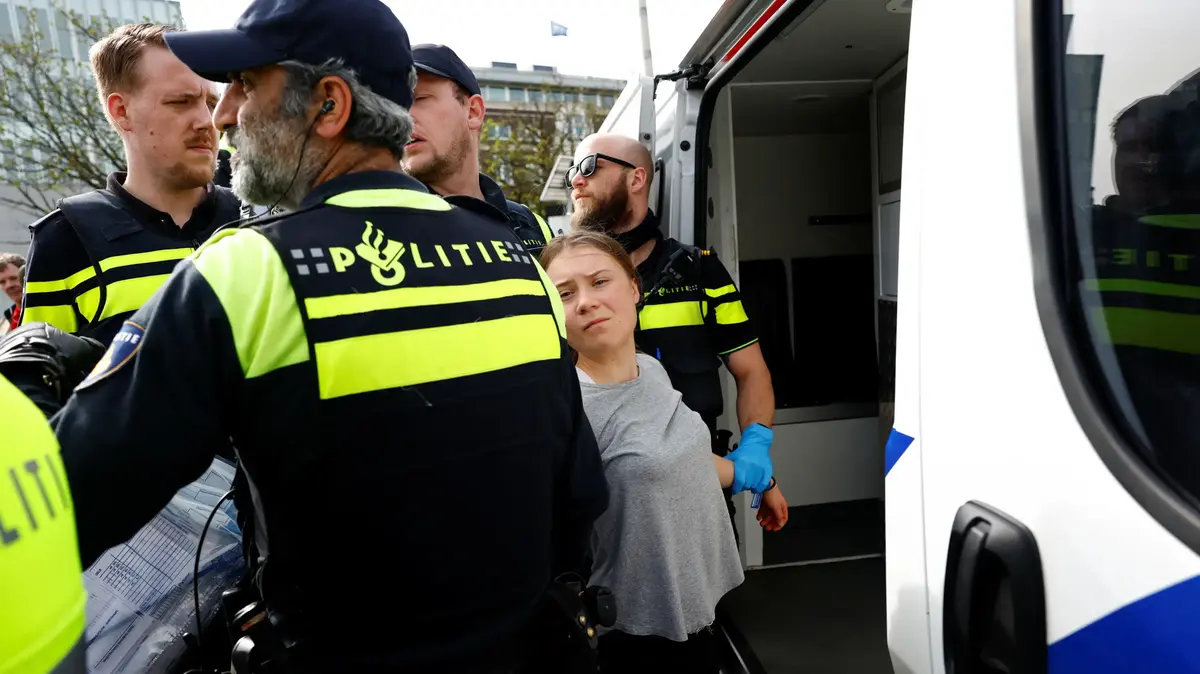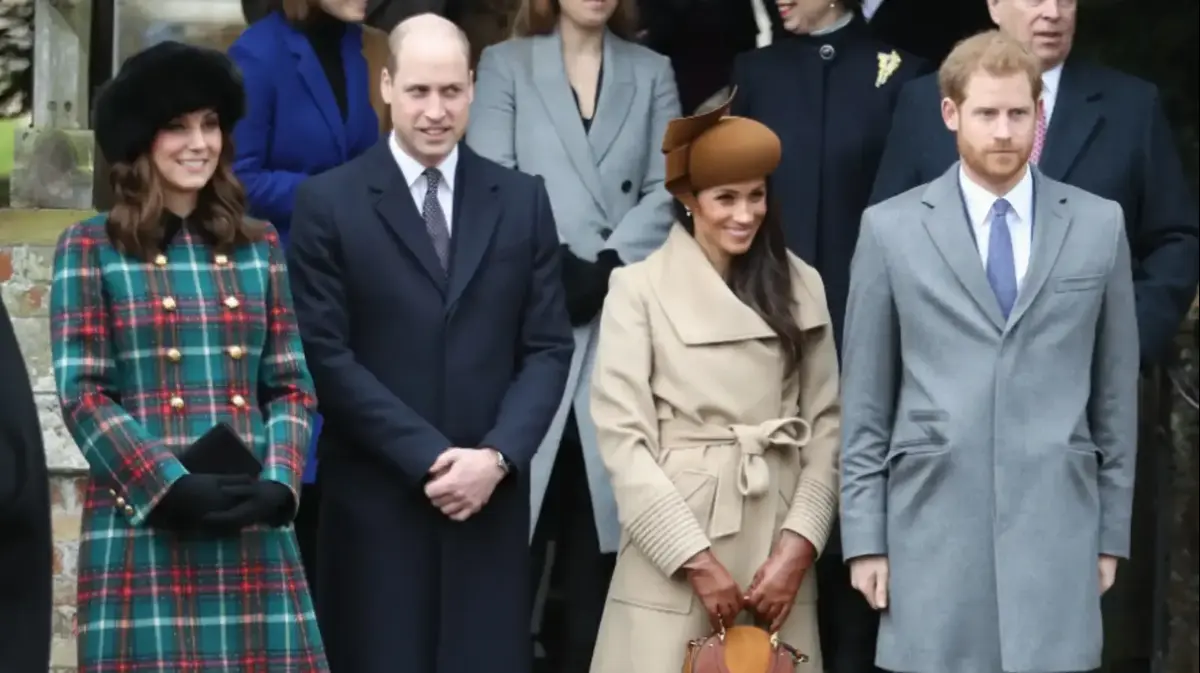Opponents of the monarchy arrested in England and Scotland 0:59
(CNN) -
As thousands of people take to the streets of the United Kingdom to remember Queen Elizabeth II after her death last week, critics of the monarchy have also used this opportunity to protest, some holding signs that say "No he is my king”, in reference to Carlos III.
Police intervened in the protests and in some cases arrested demonstrators, raising serious questions about the way some police forces are cracking down on dissent in the country.
ANALYSIS |
The queen's death may open a new chapter in the Caribbean and force crucial talks on colonialism
Liberty, a civil rights advocacy group, expressed concern in a statement: "It is deeply troubling to see the police exercising their extensive powers in such a harsh and punitive manner to suppress free speech."
CNN spoke to some of the people who faced police action this week after publicly criticizing the royal family.
Symon Hill, from Oxford, was on his way home from church on Sunday around 12:30 p.m. The man, 45, told CNN that streets in the city center had been cordoned off for a procession, making it difficult for him to get through the crowd.
Realizing that local officials were about to proclaim the accession of King Charles III, Hill decided to listen rather than insist on his effort to get home.
Mourners queue for miles to say goodbye to Queen Elizabeth at Westminster Hall
"They started reading about Elizabeth II and they expressed their grief at her death," Hill said. "I certainly wouldn't interrupt that.
I have never interfered in an act of mourning.
That's not something I would do," she added.
advertising
But when King Charles III was declared to be "our only rightful and just feudal lord," Hill recounted crying out, "Who chose him?"
"Only people who were very close could have heard. A couple of people told me to shut up. I replied that a head of state is imposing himself without our consent", something that he found "difficult to digest".
Anti-monarchy protesters hold banners during royal ceremonies in Edinburgh on Tuesday.
Hill said he was "stunned" by what happened next, describing how he was pushed back by security guards.
"Then the police came in, grabbed me, handcuffed me and put me in the back of a patrol car," he said.
"It probably wasn't more than five minutes since I questioned 'who chose him?'"
Hill also recounted that when he was in the police van, he repeatedly asked officers what law they were arresting him under.
"They didn't seem very safe, which is quite worrying. Surely arbitrary arrest is not something we should have in a democratic society," he said.
This implies the death of Queen Elizabeth II for tourists visiting the UK
And he added that he was given contradictory reasons for his arrest, as the police were not sure about arresting him.
"After many policemen spoke to each other and to their superiors through their radios, the officer who was in the van with me told me that they would release me and take me home. But that they would contact me and ask me to give an interview. at a later date. He mentioned that he could still be charged with something. Even at this point they had not responded to my questions as to what law he had been arrested under," he explained.
An anti-monarchy protester approaches the media outside Parliament on Monday.
Hill added that police officers told him on the way home that he had been arrested under the Police, Crime, Sentencing and Courts Act 2022, a controversial piece of legislation introduced this year that expands police powers. to suppress the protests.
However, a statement Thames Valley Police sent to CNN on Wednesday said Hill was arrested under Section 5 of the Public Order Act 1986, which covers offenses causing "harassment, alarm or distress".
The confusion reveals the uncertainty surrounding the right to free speech in the UK.
Precisely, after the 2022 Law "expanded the range of circumstances in which the police can impose conditions on a protest."
Under clause 78 of the new law, it is an offense for protesters to "intentionally or recklessly cause public nuisance", which includes causing "serious nuisance".
"Where does this end?"
Young Brits question the monarchy 1:41
Speaking to CNN, Steve Peers, professor of European Union law and human rights at the University of Essex, highlighted how far-reaching these new police powers can be.
"All you need to do is find one person –– which wouldn't be difficult in a crowd of people mostly paying their respects to the queen–– who would be offended by someone who is there to protest the monarchy in general".
"You could also say that anyone with a sign that says 'We love the monarchy' is seriously upsetting someone who doesn't like the monarch. Where does this end?"
Paul Powlesland, a London lawyer, was at work Monday when he saw media reports of protesters being arrested for expressing anti-monarchy views.
"In these times when the consensus is so uniform, that's when free speech is most at risk. I thought it was important to come out and point the finger at free speech," he told CNN.
Like Hill, Powlesland said he didn't want to alter expressions of actual grief.
He did not make his way to Buckingham Palace, where people pay their respects to the queen.
Rather, he went to Parliament Square, a traditional location for political protest in London, opposite the Houses of Parliament.
Powlesland went alone, holding a blank sheet of paper.
Within minutes, he said that "a police officer came up and asked me for my details. He said that if he wrote 'He is not my king,' I would probably be arrested because he is offensive under the Public Order Law."
Protesters gathered outside the Houses of Parliament on Tuesday, many holding blank banners.
"I couldn't risk writing anything on the poster because I couldn't allow myself to be arrested, as I had to represent my client in court the next morning. That's the crux: even the threat of arrest has a very chilling effect on the freedom of expression the right to protest," he said.
Powlesland posted a video of the interaction with the agent on Twitter.
The clip accumulates more than 1.4 million reproductions.
CNN asked the Metropolitan Police to confirm its position on those expressing anti-monarchist views.
"People have a right to freedom of expression and we must balance the rights of protesters with those of others who wish to grieve and respect," he responded.
"A Dangerous Precedent"
Meanwhile, in an isolated incident in Scotland's capital on Monday, a 22-year-old man was arrested "in connection with a breach of the peace on the Royal Mile," British news agency PA Media reported.
Thousands of mourners lined the streets of Edinburgh as Queen Elizabeth's hearse, accompanied by members of the royal family, made its way from the Palace of Holyroodhouse to St. Giles' Cathedral.
Police Scotland said a member of the crowd broke the silence by booing Prince Andrew and calling him "sick".
Whether the police are cracking down using the powers of the Public Order Act 1986 or the recently established Police, Crime, Sentencing and Courts Act 2022, there are freedom of expression concerns.
Liberty said in a statement to CNN: "The Police, Crime, Sentencing and Courts Act has made it much more difficult for people to stand up for what they believe in without facing the risk of criminalization...As we have already seen this week, this is clamping down on our freedom to protest and sets a dangerous precedent for the future.
Queen Elizabeth II Repression



/cloudfront-eu-central-1.images.arcpublishing.com/prisa/VZV6NXS7SREIJAIZZNECDP7DZA.jpg)





